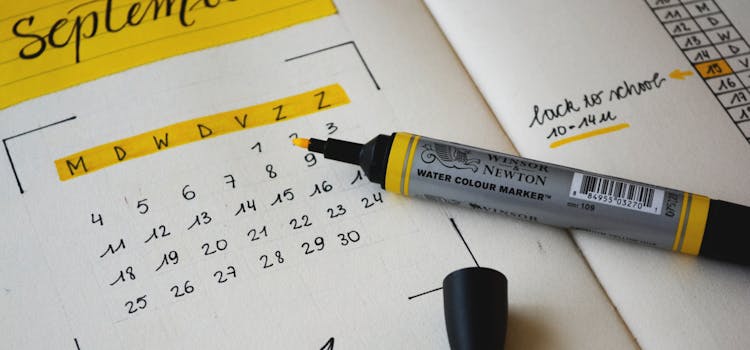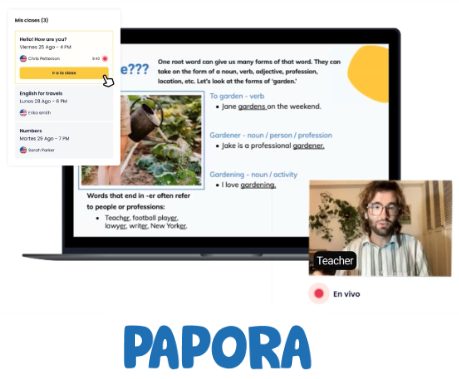The steps to create your own study plan to learn English are:
- Set your monthly goals
- Choose the topics you'll learn
- Break it down into weeks
- Organize your days
- Make it fun
- Evaluate your goals and results
You'll also find a template for your own study plan at the end of this post.
When learning a new language, organization and planning are crucial to achieving our goal.
Specifically, learning English requires quality information and hours of practice and effort to reach an intermediate level, especially if you're learning English from scratch.
The best way to organize your brain and your ideas is to create a study plan that summarizes everything you need.
That's why, at Papora, we've created this article for you, with everything you need to create it to your liking. Discover it below.
Papora is the first step to achieving your goals
Learn English with the best lessons, completely at your own pace.
Start now

What is a study plan for?
Even if you don't think it's a good study plan, it's what allows students to avoid setbacks and feel motivated to stay on track toward their English learning goals.
This is a crucial tool that will allow you to have control over what you study, the topic you want to learn, the materials you use, and the foundations you use for your plans.
Organize your way of learning English
Having a study plan for learning English allows you to organize everything according to your preferences — from the days you study to the content you focus on.
You can learn English at your own pace
One of the best advantages of having a study plan is the great opportunity you have to control your own pace of learning English.
With awareness and determination in what you do, taking into account your goals and the time you've set for achieving them, you decide your own study days, the number of hours that suit you, and which tools you want to use.
Many learners support this approach by using the best online English platforms for consistent structure and guidance.
What should I consider before creating a study plan?
Although creating your own study plan gives you a handle on what you want to do and how you're going to do it, you should keep in mind important points that will guide you on the right path so you can achieve what you want.
“First and foremost, having a study plan requires the right mindset, willpower, discipline, and showing up a little every day. Consistency is key. You can't just start and stop, or you'll never get anywhere. Practice different skills and keep an organized notebook. Sections for verbs, vocabulary, phrases, slang, TV shows, and expressions, and practice listening, speaking, reading, and writing.”
Define the goals you want to achieve
The most important thing, before creating your study plan, is to define your motivation and objectives so that you are clear about what your goals will be.
“I believe everyone should create a study plan based on their goals and the time they actually have to study. What every study plan should have in common is that you incorporate regular study sessions into your week. It's better to study every day for 20 minutes than just once a week.”
Think about why you want to study English, what motivates you most, what your vision is for what you want to do, and, above all, what your main goal is.
For example: You want to learn English because you want to travel to many countries or go on an exchange, and you want to know what to do in all situations. That would be your long-term goal, your main goal.
Divide your goals into short- and medium-term goals.
Once you're sure of your main goal, you should divide your goals into what you can achieve in the short and medium term.
Make a timeline of what you have in mind, a guide to what you can achieve little by little, and above all, believe in yourself.

Create your own English study plan step by step
If you've already decided to learn English, you're sure you want to do so with in-person classes or prefer to learn from home, and you've already defined your goals.
Then this is the right time to take control of your learning and create your study plan.
If you've decided to learn with a teacher, you can have a conversation with them and ask for advice, but if you're working from home, these are the steps you should follow:
Step 1: Set your monthly goals

Considering that you're already aware of your main goals, it's time to create a plan where you set small, realistic monthly goals that you can gradually achieve. To guide you through this process, you can use our free English study guide to structure your approach and keep yourself on track.
This will be crucial to helping you stay motivated, allowing you to focus on your vision and gain a better understanding.
A good example of this would be to aim to study vocabulary and grammar in your first month so you can present yourself without any problems.
Step 2: Choose the Topics to Learn
This is one of the most important steps; your future knowledge will depend on it. Research a variety of topics that you can include in your study plan.
Also, if you're looking to learn for business or a specific niche, you should take this into account when including and choosing topics, since the vocabulary of a psychologist won't be the same as that of an engineer.
For example, include topics such as: basic English, verbs in English and Spanish, verb tenses, travel vocabulary, the English alphabet, how to use "this, these, that, and those," or how to say numbers in English. Using structured English learning books helps keep these topics organised.
Step 3: Divide it into weeks
To make your learning more effective, it’s best to organize your weeks with a clear plan — outlining the key topics you’ll study, the methods you’ll use, and building a structured learning environment for yourself.
For example, in week 1, you could focus on the negative form of the verb to be, along with letters and numbers. In week 2, you might move on to learning the grammar and vocabulary used for greetings.
Step 4: Organize Your Days
It's essential that you effectively organize your study days. Assign tasks, activities, study topics, exercises, and ways to learn and put everything into practice.
If you're short on time, you can set it to just 5 minutes a day, perhaps when you get home from work or school, or you can also schedule it to just one day a week.

The important thing is that the time is proportional to the effort you want to put in and how quickly you want to level up.
That is, if you're going to study once a week but want to learn quickly, it's best to dedicate about 3 hours. However, if you're going to study for several days and aren't in a hurry, you can dedicate about 30 minutes.
It's also crucial to set limits, and if you feel like you can't understand what you're studying, take breaks.
Step 5: Make it Fun
Find ways to learn English that are fun for you. If reading isn't your thing, studying with textbooks definitely won't work for you.
You can use all kinds of strategies to learn languages, such as songs or videos with subtitles, listening to radio like the BBC, or listening to many English-language media outlets.

If it suits you better, you can learn through games, an app, practical exercises, a fiction book, or talking with other people who speak English. The important thing is that these activities are fun for you and that they align with your goals.
“Maybe your way of learning is by watching movies, pausing them after ten minutes, and writing down the story so far—just because it's not in a textbook doesn't mean it isn't great practice! Staying motivated is very individual; don't try to follow someone else's "rules," find your own flow.”
Step 6: Evaluate the Objectives and Results
At the end of your first week with your new study plan, it's crucial to analyze the results. Consider whether you've felt a change, even a small one, whether you've learned new words, and whether what you've been doing has worked.
This will allow you to feel motivated by the positive results and what you've accomplished, or to realize what you're doing wrong and be able to update your study plan for the better.
Here's a visual example of what your study plan could look like:

What's the best way to learn English?
While it's possible to learn English on your own, if you're looking for quality content created class by experts, your best bet is to enroll in an online course.
Platforms like Papora have their own certified method, where you can easily learn English with dynamic exercises and real-life situations, with the opportunity to watch unlimited classes with native-level teachers, and a self-guided course that allows you to stay in the loop.
If you've come this far, it's because you're interested in starting to learn. So don't forget that we've created a downloadable template for you that you can print, so it's much faster and you can begin your dream of learning English.
Frequently asked questions about the English study plan
If you're starting from scratch, the key elements will be letters, numbers, their pronunciation, and basic grammar and vocabulary to help you introduce yourself. However, keep in mind that there's no mandatory order; the important thing is to start with useful content, just as the Papora method suggests.
The best time to learn English (and many other things) is in the morning, when you're rested and have enough energy to fully absorb what you're learning. However, this really depends on you and what time of day you feel most comfortable and active studying.






